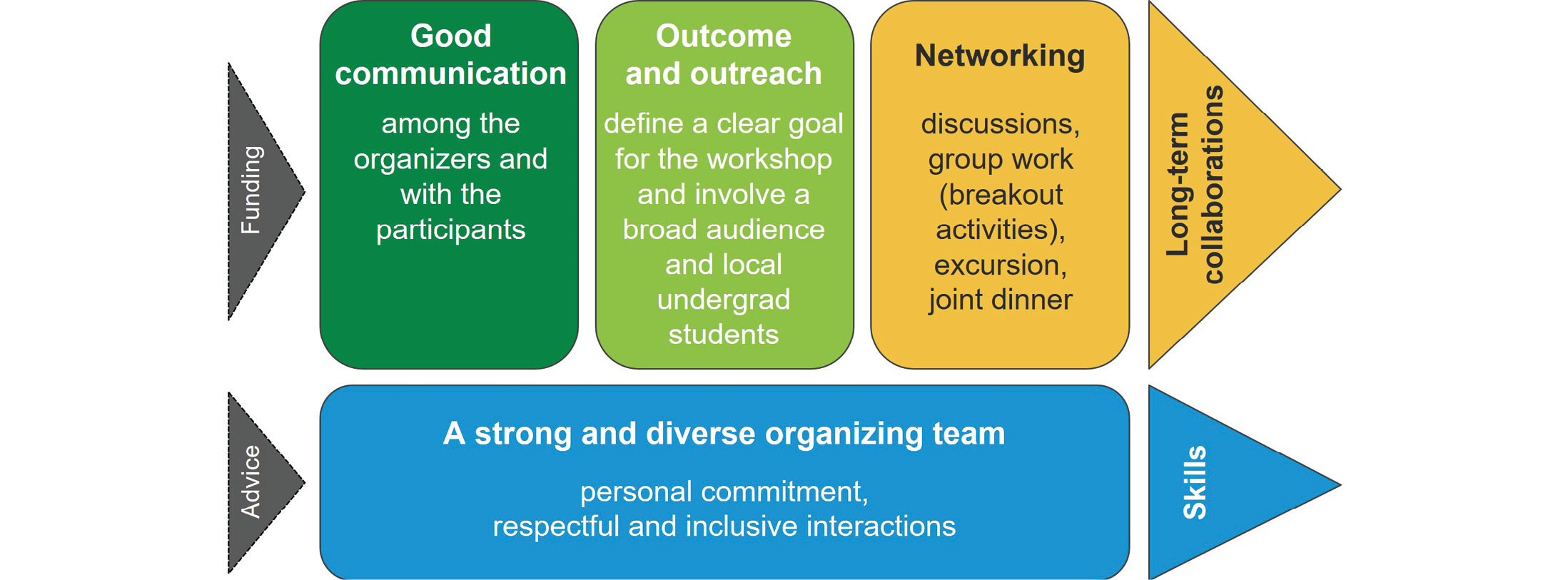- Home
- Publications
- PAGES Magazine
- Advice On How To Organize An ECR Workshop: Lessons Learned During PASES 2022
Advice on how to organize an ECR workshop: Lessons learned during PASES 2022
Anna-Marie Klamt, F. Charqueno, A.A. Isa, E. Orijemie, F. Ferrario, G. Camperio, K. Davies, I.A. Jara, M. Mariani, N. Mehrotra, V. Merino and X. Benito
Past Global Changes Magazine
31(1)
39
2023
Anna-Marie Klamt 1,2, F. Charqueno
1,2, F. Charqueno 3, E. Orijemie
3, E. Orijemie 4, F. Ferrario
4, F. Ferrario 5, G. Camperio
5, G. Camperio 6,7, K. Davies
6,7, K. Davies 8, I.A. Jara
8, I.A. Jara 9, M. Mariani
9, M. Mariani 10, N. Mehrotra
10, N. Mehrotra 11, V. Merino12 and X. Benito
11, V. Merino12 and X. Benito 13
13
During the three years leading up to the PASES 2022 workshop (pastglobalchanges.org/calendar/26972), the organizers gained valuable knowledge in workshop organization and want to share this with future early-career researcher (ECR) workshop organizers.
1. Bottom-up approach
The initiative should derive from ECRs themselves, who wish to bring people together with similar research interests, visions for collaboration, and career-stage concerns. Associations like INQUA and PAGES may provide funding and guidance.
2. A diverse and strong team
Our experience shows that diversity in culture, research background, and career stage contribute to creative and well thought out decisions. Success requires that everyone listens carefully to all voices and opinions, and that decisions are made in a democratic and pragmatic way. Once issues are discussed in-depth, decisions are often much easier to make, and defend.
3. Community surveys
Before launching a workshop, a short survey asking for information on, for instance, career stage, research interests, and potential contribution and expectations of the workshop can be used to evaluate the interest to participate in the workshop.
4. Organization logistics
The costs of the workshop (including lunch and coffee breaks, excursion, formal dinner, accommodation, travel costs, small items, and consumables) should be estimated carefully and with a 10–15% buffer. The venue should be chosen considering practical issues, like space, and technical facilities that allow for hybrid events. Pre-recorded talks reduce technical issues and complications due to time-zone differences and travel restrictions. Visa applications should be initiated as early as possible, and one should be prepared for (last-minute) cancellations.
5. Dedication
Event organization entails great personal commitment and is time consuming, e.g. frequent meetings over long time periods, selecting and keeping in contact with participants, and creating an interesting, meaningful, and diverse program.
6. Communication
Communication between organizers and with the participants is crucial. Here, frequent meetings with a written record on decisions made, and platforms for document sharing that can easily be accessed by everyone, are essential. Further, clear and timely communication about the workshop’s topic, target group, format, outcome, registration/application/selection procedures (e.g. definition of ECR), and deadlines is important.
7. Selection of participants
A system on how to rank applications in a balanced (including geographic and gender distribution), independent, and efficient way should be developed beforehand. Further, a structure in which each abstract is graded, based on criteria such as fit of topic, novelty, and research quality, can be helpful. Financial support is essential to facilitate participation of ECRs from low-income countries.
8. Networking
Interaction and networking are key elements of a workshop, and sufficient time should be allocated. Breakout activities are an established method to foster fruitful discussions. Here, it is important to communicate the goal clearly so that all participants know their role. Not only scientific, but also more general topics (e.g. "the challenges of being an ECR") provide a good basis for discussions. Other ways to combine knowledge growth and communication between participants, and create time to relax, are social gatherings and field excursions.
9. Involve locals
Involving local undergrad students will give them the chance to get closer insights into research, join a scientific community, take responsibility, and show engagement. They can be key for solving problems on site by overcoming language barriers. Further, cultural and scientific exchange with local students is an added value for both participants and organizers.
10. Outreach talks
Outreach talks can be organized to give a broad audience the chance to be involved in scientific activities. They are a good exercise for ECRs to present and receive feedback from people outside their research area.
11. Wrapping up, and the end?
At the end, certificates need to be handed out, finances consolidated, the event reported on, the results from breakout activities summarized, and then the workshop is over. But is it really over? Ideally, the established network becomes a base for long-term research collaborations, including the organization of further conference sessions or workshops.
affiliations
1Department of Biology, University of Southern Denmark, Odense, Denmark
2Faculty of Geography, Yunnan Normal University, Kunming, China
3CENAC-PNNH-CONICET, San Carlos de Bariloche, Argentina
4Department of Archaeology & Anthropology, University of Ibadan, Nigeria
5Department of Science and High Technology, University of Insubria, Como, Italy
6Department of Surface Waters - Research and Management, EAWAG, Dübendorf, Switzerland
7Department of Earth Science, ETH Zürich, Switzerland
8Institute for Modelling Socio-Environmental Transitions (IMSET), Bournemouth University, UK
9Department of History and Geography, University of Tarapacá, Arica, Chile
10School of Geography, University of Nottingham, UK
11Birbal Sahni Institute of Palaeosciences, Lucknow, India
12National University of Mar del Plata, Argentina
13Continental and Marine Waters Programme, Institute of Agrifood Technology and Research, IRTA, La Ràpita, Spain
Anna-Marie Klamt: %20amklamt outlook.de (amklamt[at]outlook[dot]de )
outlook.de (amklamt[at]outlook[dot]de )
